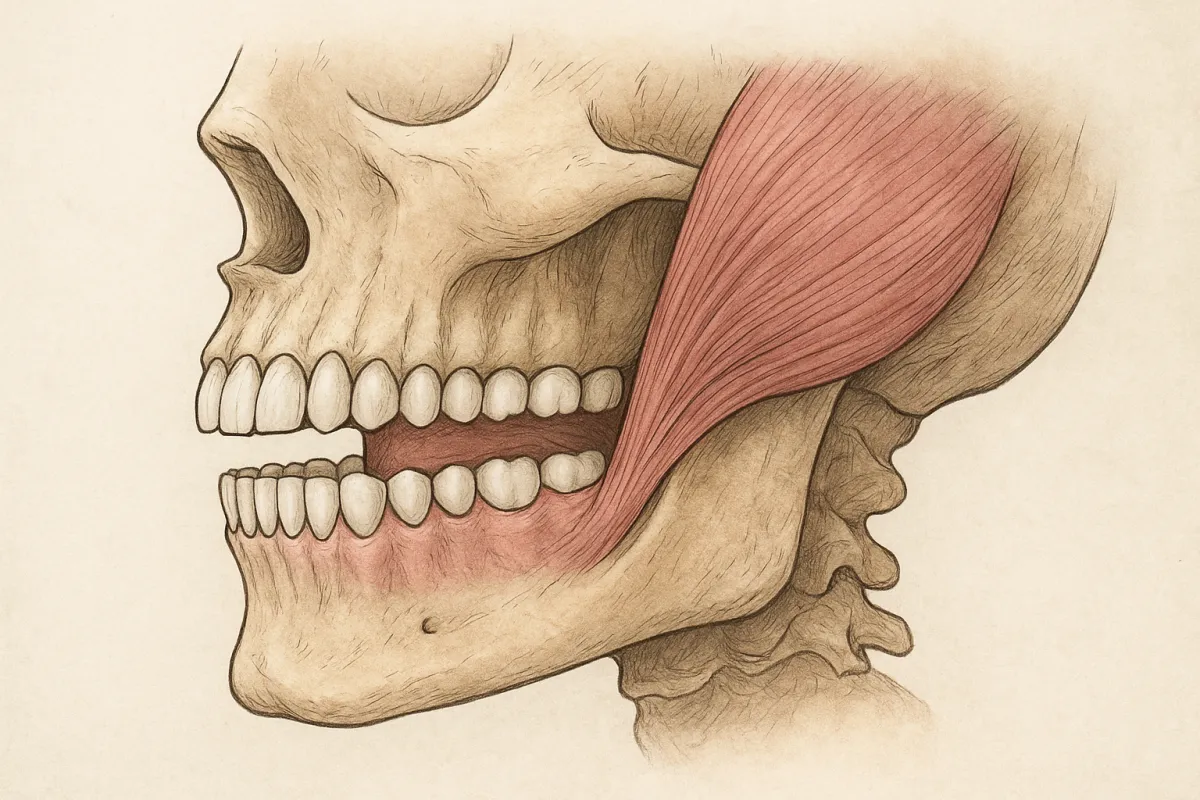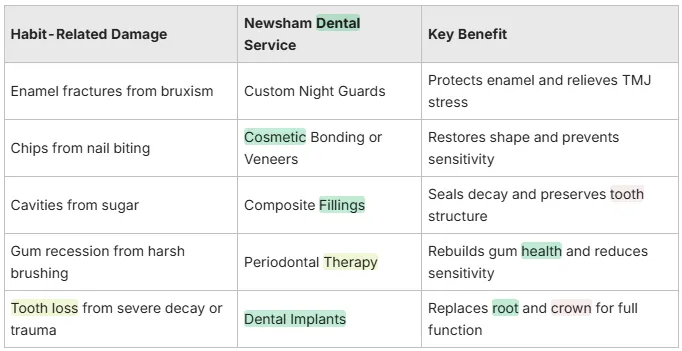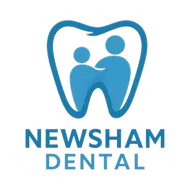5 Everyday Habits Secretly Damaging Your Teeth
Every time you clench your jaw at night or mindlessly nibble on a pen, microscopic damage is silently accumulating on your enamel. Newsham Dental, your trusted family dentist in Rialto, understands how everyday behaviors like bruxism, nail biting, and acidic drinks erode tooth structure and undermine confidence. In this guide, we’ll define each harmful habit, explain why it damages your teeth, illustrate real-life examples of wear, and reveal proven solutions — from custom night guards to minimally invasive oral surgery. By the end, you’ll know how to protect your smile and when to turn to expert care for lasting restoration.

What Is Teeth Grinding (Bruxism) and How Does It Damage Your Teeth?
Teeth grinding, or bruxism, is the involuntary clenching of upper and lower teeth that subjects enamel to extreme bite forces and creates microfractures. This chronic habit accelerates enamel erosion, triggers jaw muscle fatigue, and can even lead to chipped or cracked teeth after repeated stress.
The Impact of Bruxism on Dental Health
Bruxism, or teeth grinding, can lead to significant dental issues, including enamel erosion, jaw muscle fatigue, and even chipped or cracked teeth. The constant force exerted during grinding creates microfractures in the enamel, which can worsen over time.
Lobbezoo, F., et al., "Bruxism defined: recent findings and future directions." Clinical Oral Investigations (2018)
This research supports the article's discussion of bruxism's damaging effects on teeth and the need for intervention.
What Causes Teeth Grinding and Who Is at Risk?
Stress, anxiety, sleep apnea and an uneven bite all contribute to bruxism.
1. Psychological Stress: Tension triggers nighttime clenching.
2. Bite Misalignment: Malocclusion creates uneven force distribution.
3. Sleep Disorders: Interrupted breathing patterns coincide with jaw tightening.
4. Age and Anatomy: Adults with a family history of bruxism are more susceptible.
Regular monitoring of these risk factors helps intercept grinding early and protect dental health.

What Are the Signs and Symptoms of Bruxism Damage?
Common indicators of chronic grinding include:
-Flattened tooth surfaces and worn cusps
-Increased tooth sensitivity to hot or cold
-Frequent headaches or earaches upon waking
-Tenderness in the jaw joints and facial muscles
Spotting these signs early allows timely intervention before fractures develop.
How Can Teeth Grinding Lead to Jaw Pain and Tooth Fractures?
Repeated clenching overtaxes the temporomandibular joint (TMJ), causing inflammation and pain that radiates through the jaw and neck. Enamel’s natural hardness can’t withstand constant abrasive contact, so microcracks form and eventually widen into visible fractures. Left unaddressed, these cracks may require crowns or even extraction in severe cases.
What Are Effective Solutions for Teeth Grinding?
Protecting teeth from bruxism damage begins with a multi-pronged approach:
1. Custom Night Guards: Dental splints absorb bite force and safeguard enamel.
2. Stress Management Techniques: Meditation and biofeedback reduce clenching triggers.
3. Botox Injections: Targeted muscle relaxation decreases grinding intensity.
4. Bite Adjustment: Minor enamel reshaping balances your occlusion.
Combining these therapies restores bite harmony and preserves dental structure.
How Does Nail Biting and Chewing Hard Objects Harm Your Teeth?
Habitual nail biting and chewing on ice, pens or other hard objects applies uneven stress to tooth enamel, creating chips and tiny fissures that expand under normal chewing loads.
Why Do People Bite Nails or Chew Ice and Pens?
Many engage in these behaviors to relieve stress or boredom.
- Nail Biting: Nervous energy is discharged through enamel contact.
- Ice Chewing: Cold and crunch satisfy oral fixation but fracture enamel.
- Pen or Pencil Chewing: Tactile stimulation becomes a damaging routine.
- Understanding the root causes is the first step toward breaking these habits.

What Types of Dental Damage Result from These Habits?
Chewing hard objects or nails can cause:
-Chipped or fractured tooth edges
-Accelerated enamel wear at biting surfaces
-Jaw muscle fatigue and temporomandibular strain
-Gum irritation from sharp fragments
These injuries often go unnoticed until pain or sensitivity emerges.
How Can You Stop Nail Biting and Prevent Further Damage?
Breaking these habits requires targeted strategies:
1. Apply bitter-tasting nail polish as a deterrent.
2. Keep nails trimmed to remove the temptation.
3. Use stress-relief tools like squeeze balls or fidget spinners.
4. Practice habit reversal therapy with professional guidance.
Implementing these techniques protects enamel and promotes healthier coping mechanisms.
When Is Emergency Dental Care Needed for Habit-Related Injuries?
Seek urgent care if you experience sudden pain, bleeding or a visibly broken tooth. Newsham Dental offers same-day emergency treatment, including bonded repairs, crowns or veneers to restore function and appearance.
How Do Sugary Foods and Acidic Drinks Affect Your Tooth Enamel?
Consuming sugary snacks and acidic beverages unleashes acids that demineralize enamel, creating soft spots prone to cavities and erosion.

How Does Sugar Promote Tooth Decay and Cavities?
Sugar fuels the growth of oral bacteria, which metabolize carbohydrates and release lactic acid. This acid lowers pH levels and dissolves tooth minerals, forming cavities in as little as 24 hours after exposure.
What Is Enamel Erosion and How Do Acidic Drinks Contribute?
Enamel erosion is the gradual loss of protective tooth surface due to acid exposure. Citrus juices, sodas and sports drinks have pH values as low as 2.5, which softens enamel and accelerates mineral loss with each sip.
The Dangers of Acidic Drinks
Regular consumption of acidic beverages, such as sodas and sports drinks, can erode tooth enamel, making teeth more susceptible to cavities. The low pH levels in these drinks soften the enamel, leading to mineral loss and potential decay.
Lussi, A., "Dental erosion: diagnosis, classification and clinical aspects." European Journal of Oral Sciences (2006)
This citation reinforces the article's warning about the detrimental effects of acidic drinks on dental health.
What Dietary Changes Can Protect Your Teeth?
Implement these nutritional adjustments to shield enamel:
-Replace soda with sparkling water and a twist of lime.
-Limit sticky sweets and rinse with plain water afterward.
-Include cheese, yogurt or nuts to boost saliva production.
-Chew sugar-free gum to neutralize acids.
Adapting your diet reduces acid challenges and supports remineralization.
What Dental Treatments Address Damage from Sugary and Acidic Habits?
Below is a comparison of common habit-related damage and the services that restore enamel integrity:

Can Brushing Too Hard or Improperly Damage Your Teeth and Gums?
Yes, aggressive brushing or incorrect technique can wear down enamel and cause gum recession, exposing sensitive dentin.
What Are the Signs of Gum Recession and Toothbrush Abrasion?
Look for these symptoms of overbrushing:
-Notches at the gumline and root exposure
-Redness, swelling or bleeding of gums
-Heightened sensitivity to temperature changes
-Dull, thinned enamel at brushing sites
Identifying these warning signs allows you to correct your hygiene routine.
How Should You Brush and Floss to Protect Your Oral Health?
Follow these best practices for safe cleaning:
1. Use a soft-bristled brush and gentle circular motions.
2. Angle the brush 45° toward the gumline for effective plaque removal.
3. Floss once daily with waxed tape to avoid shredding.
4. Replace your toothbrush every three months or when bristles fray.
The Importance of Proper Brushing Techniques
Aggressive brushing or incorrect techniques can wear down enamel and cause gum recession, exposing sensitive dentin. Using a soft-bristled brush and gentle circular motions, along with proper flossing, are essential for maintaining oral health and preventing damage.
American Dental Association, "Brushing Your Teeth" (2024)
This supports the article's advice on proper oral hygiene practices to prevent damage to teeth and gums.
When Is Professional Gum Disease Treatment Necessary?
If gums bleed during brushing, appear puffy or form deep pockets, you may need periodontal care. Newsham Dental’s gum disease services include deep cleanings, scaling and root planing to restore gum health.
How Do Regular Dental Cleanings Help Prevent Habit-Related Damage?
Routine professional cleanings remove hardened plaque, polish enamel and detect early signs of wear or erosion. This proactive care prevents minor issues from escalating into complex restorative procedures.
Why Is Using Your Teeth as Tools Risky for Your Dental Health?
Using teeth to open packages, cut tape or crack nuts creates focal points of stress that enamel and underlying dentin aren’t designed to withstand.
What Types of Damage Can Result from Using Teeth to Open or Cut?
Common consequences include:
-Chipped cusps and fractured edges
-Hairline cracks that extend toward the pulp
-Dislodged fillings or crowns
-Rapid wear of incisal and occlusal surfaces
Avoiding tool-use preserves structural integrity and prevents costly repairs.
What Are Safe Alternatives to Using Teeth as Tools?
Replace risky behaviors with these substitutes:
-Use scissors, utility knives or pliers for opening packages.
-Carry a keychain screwdriver for unexpected tasks.
-Keep snack packets pre-cut with kitchen shears.
-Use dedicated bottle openers rather than incisors.
These small habit changes protect your teeth from mechanical overload.
How Can Cosmetic Dentistry Repair Damage from This Habit?
Cosmetic solutions restore form and function after tool-related injuries:
Dental Bonding: Repairs minor chips with composite resin.
Porcelain Veneers: Conceals extensive enamel loss.
Full-Coverage Crowns: Strengthens teeth weakened by deep cracks.
Matching service to the extent of damage ensures a lasting, natural-looking result.
When Should You Seek Emergency Dental Care for Dental Fractures?
Immediate attention is required if you experience acute pain, swelling or bleeding following a fracture. Newsham Dental offers prompt emergency appointments to stabilize the tooth and plan definitive restoration.
How Can Newsham Dental Help Restore Your Smile from Habit-Related Damage?
At Newsham Dental, we combine expert oral surgery, dental implants and preventive care to reverse the effects of harmful habits and rebuild confidence.
What Dental Services Address Damage from These 5 Habits?
Below is an overview of common habit-related damage and the corresponding Newsham Dental solutions:

How Do Dental Implants Restore Function and Confidence After Tooth Loss?
Dental implants replace missing tooth roots with titanium posts that fuse to the jawbone. Once an implant supports a custom-made crown, it restores biting force and prevents bone loss, delivering a natural feel and radiant smile.
What Oral Surgery Options Are Available for Severe Dental Damage?
For advanced cases, our oral surgery services include:
-Tooth Extractions and Bone Grafting to prepare sites for implants
-Ridge Augmentation to rebuild lost bone volume
-Wisdom Tooth Removal to prevent adjacent tooth damage
How Does Compassionate Care Improve Your Dental Treatment Experience?
At Newsham Dental, every procedure is delivered with empathy and clear communication. We offer sedation options, personalized treatment plans and ongoing support to ensure your journey from diagnosis to recovery is comfortable and confidence-building.
What Are Common Questions About Habits That Hurt Your Teeth?
What Habits Most Commonly Cause Tooth Decay?
Sugary snacking between meals, frequent sipping of soda or juice, and failing to rinse after acidic foods are top contributors to tooth decay by sustaining bacterial acid attacks on enamel.
Is Chewing Ice Bad for My Teeth?
Yes, chewing ice subjects enamel to extreme cold and hardness that can create microfractures, chipped edges and increased sensitivity by forcing tiny cracks to expand under biting pressure.
What Foods Erode Tooth Enamel the Most?
Citrus fruits, sports drinks, wine and carbonated sodas have high acidity levels that soften enamel surface, making teeth more vulnerable to erosion and decay when consumed frequently.
Can Brushing Too Hard Really Damage My Teeth?
Absolutely. Excessive force abrades enamel at the gumline and promotes gingival recession, which exposes sensitive dentin and increases the risk of root decay and discomfort.
Maintaining awareness of these everyday habits and seeking timely care can stop irreversible damage before it escalates.
Schedule a consultation at newshamdental.com or call today to protect your smile and regain lasting confidence.
Patient Resources & Insurance Information – Newsham Dental in Rialto, CA
At Newsham Dental, we believe that quality dental care should be accessible and affordable for every family. Our Rialto dental clinic proudly works with a wide range of insurance providers and offers flexible payment options, including in-house plans, to make your treatment as stress-free as possible
Insurance Plans We Accept
We are contracted with many major dental insurance providers, making it easier for you to get the care you need without unnecessary financial strain. Here are a few currently accept:
Delta Dental
MetLife
Aetna
Humana
In addition to these, Newsham Dental works with numerous other insurance companies. Our friendly front office team can help you confirm your coverage and maximize your benefits before your appointment.




In-House Payment Plans
For patients without insurance or those looking for more flexible options, we offer an in-house payment plan. This allows you to receive the treatment you need now and spread out the cost over time — with no hidden fees or confusing terms.

Questions About Your Coverage?
Insurance policies can be complex, but you don’t have to figure it out alone. Contact our office, and our knowledgeable team will gladly review your benefits, explain your payment options, and help you plan your care with confidence.

Contact Us
Hours of Operation:
Monday-Thursday: 9AM-5PM
Friday: By Appointment Only
Walk-ins Welcome
